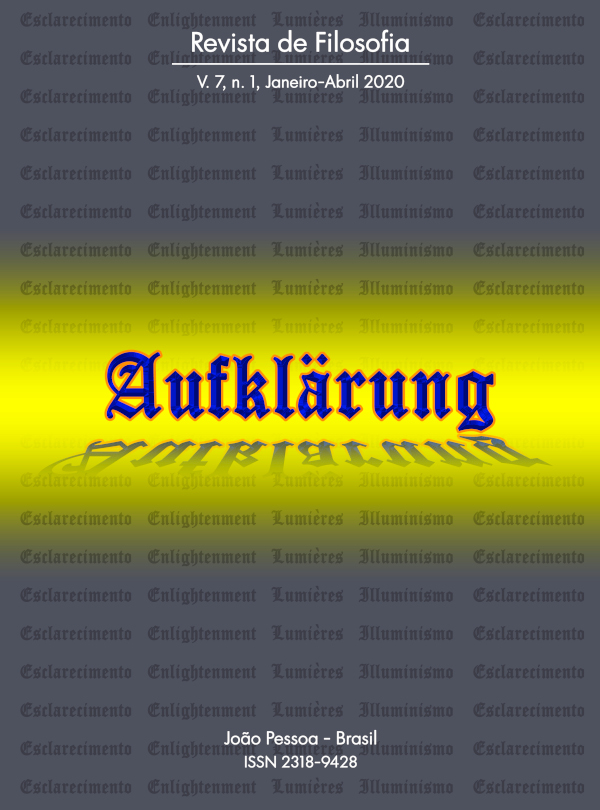The theory of reminiscence in Augustine: appropriation and criticism
DOI:
https://doi.org/10.18012/arf.v7i1.43911Keywords:
Reminiscence;, Lighting, Truth, PreexistenceAbstract
This article aims at receiving the Platonic theory of reminiscence in Augustine and aims to present how the bishop of Hippo appropriates Plato's thesis to build his theory of enlightenment. From the fundamental texts of Plato's theory of knowledge there is a discussion about the validity or otherwise of the so-called reminiscence and what would be its true content. Augustine, centuries later, is faced with the same problem explored by him and needs a different answer: to explain knowledge present in the soul that does not originate from experience and yet does not come from the preexistence of the soul. We shall therefore approach Augustine's movement of reception, criticism, and appropriation of Platonic theory, as well as the Augustinian answer to the problem to which Plato, according to him, does not respond satisfactorily.
Downloads
References
AURELIUS AUGUSTINUS. Les Révisions. Traduzido do latim por Gustave Bardy. Paris: Desclée de Brouwer, 1950. 663 p. (Bibliothèque Augustinienne, 12).
________. Sobre a potencialidade da alma − De quantitade animae. Tradução de Aloysio Jansen de Faria. Petrópolis: Vozes, 1997.
________. Sobre o Mestre. Tradução de Angelo Ricci. São Paulo: Abril, 1973 (col.“Os Pensadores”, VI).
_______. Solilóquios. Tradução de Ir. Nair de Assis Oliveira. São Paulo: Paulinas, 1993.
PLATÃO. Tutti gli Scritti. Università Cattolica del Sacro Cuore di Milano: Rusconi, 1997, sesta edizione. A cura di Giovanni Reale.
ALFARIC, P. L’évolution intellectuelle de saint Augustin, l. Du manichéisme au
néoplatonisme. Paris: E. Nourry. 1918.
ALTMAN, W.H.F. The Revival of Platonism in Cicero's Late Philosophy. Platonis aemulus and the Invention of Cicero. p. xxxii + 350. Lanham, Boulder, New York and London: Lexington Books, 2016.
BEIERWALTES, W. Agostino e il neoplatonismo cristiano. [s.l]: Vita e Pensero, 1995.
BROWN, P. Santo Agostinho, uma biografia. [tradução Vera Ribeiro] – Rio de Janeiro: Record, 2005.
CAPANAGA, V. Augustin de Hipona, maestro de la conversión cristiana. Biblioteca
de autores cristianos. Madrid, 1974.
CAYRÉ, F. Initiation a la philosophie de saint Augustin. Paris, Études Augustiniennes, 1947.
CILLERUELO, L. “Por qué MemoriaDei?” In: Révue de études augustiniennes 9, 1963, p.289-294.
CORNFORD, F. La teoria platônica del conocimiento – el Teeteto y el Sofista. Buenos Aires: Paidós, 1968.
DIXSAUT, M. Platão e a questão da alma. [tradução Cristina de Souza Agostini]. – São Paulo: Paulus, 2017.
GILSON, E. Introdução ao estudo de Santo Agostinho. Tradução Cristiane Negreiros Ayoub. Discurso Editorial; São Paulo: Paulus, 2006.
HESSEN, Joannes. Teoria do conhecimento. Tradução de João Vergílio Gallerani Cuter. Revisão técnica de Sérgio Sérvulo da Cunha. São Paulo: Martins Fontes, 1999.
MARROU, H. I. Saint Augustin et l’augustinisme, [s.l.] Maîtres spirituels, 1995.
SCOTT, D. Platonic anamnesis revisited. In: The Classical Quarterly 37 (ii) 346-366 (1987).
STREFLING, S. R. Os sete graus de atividade da alma humana no De quantitate animae de santo Agostinho.Trans/Form/Ação, Marília, v.37, n.3, p.179-200, Set./Dez., 2014.
Additional Files
Published
How to Cite
Issue
Section
License
Journal general policy
1.This journal works under a Creative Commons License aplied to online journals. That icence can be read in the following link: Creative Commons Attribution 4.0 International (CC BY 4.0).
2.Accordingly to this License, a)the journal declares that authors hold the copyright of their articles without restrictions, and they can archieve them as post-print elsewhere. b)the journal allow the author(s) to retain publishing rights without restrictions.
Metadata Policy for information describing items in the repository
1. Anyone may access the metadata free of charge at anytime.
2.The metadata may be re-used in any medium without prior permission, even commercial purposes provided the OAI Identifier or a link to the original metadata record are given, under the terms of a CC BY license refered for the Journal.







































